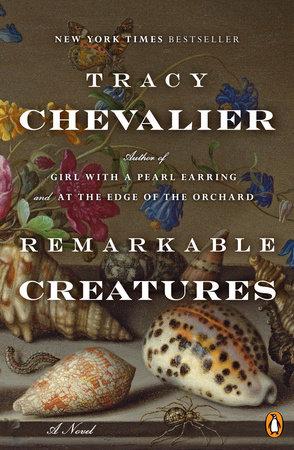Remarkable Creatures Reader’s Guide
By Tracy Chevalier


INTRODUCTION
A voyage of discoveries, a meeting of two remarkable women, and extraordinary time and place enrich bestselling author Tracy Chevalier’s enthralling new novel
From the moment she’s struck by lightening as a baby, it is clear that Mary Anning is marked for greatness. On the windswept, fossil-strewn beaches of the English coast, she learns that she has “the eye”-and finds what no one else can see. When Mary uncovers an unusual fossilized skeleton in the cliffs near her home, she sets the religious fathers on edge, the townspeople to vicious gossip, and the scientific world alight. In an arena dominated by men, however, Mary is barred from the academic community; as a young woman with unusual interests she is suspected of sinful behavior. Nature is a threat, throwing bitter, cold storms and landslips at her. And when she falls in love, it is with an impossible man.
Luckily, Mary finds an unlikely champion in prickly Elizabeth Philpot, a recent exile from London, who also loves scouring the beaches. Their relationship strikes a delicate balance between fierce loyalty, mutual appreciation, and barely suppressed envy. Ultimately, in the struggle to be recognized in the wider world, Mary and Elizabeth discover that friendship is their greatest ally.
Remarkable Creatures is a stunning novel of how one woman’s gift transcends class and social prejudice to lead to some of the most important discoveries of the nineteenth century. Above all, is it a revealing portrait of the intricate and resilient nature of female friendship.
“I was born and grew up in Washington, DC. After getting a BA in English from Oberlin College (Ohio), I moved to London, England in 1984. I intended to stay 6 months; I’m still here.
“As a kid I’d often said I wanted to be a writer because I loved books and wanted to be associated with them. I wrote the odd story in high school, but it was only in my twenties that I started writing ‘real’ stories, at night and on weekends. Sometimes I wrote a story in a couple evenings; other times it took me a whole year to complete one.
“Once I took a night class in creative writing, and a story I’d written for it was published in a London-based magazine called Fiction. I was thrilled, even though the magazine folded 4 months later.
I worked as a reference book editor for several years until 1993 when I left my job and did a year-long MA in creative writing at the University of East Anglia in Norwich (England). My tutors were the English novelists Malcolm Bradbury and Rose Tremain. For the first time in my life I was expected to write every day, and I found I liked it. I also finally had an idea I considered ‘big’ enough to fill a novel. I began The Virgin Blue during that year, and continued it once the course was over, juggling writing with freelance editing.
“An agent is essential to getting published. I found my agent Jonny Geller through dumb luck and good timing. A friend from the MA course had just signed on with him and I sent my manuscript of The Virgin Blue mentioning my friend’s name. Jonny was just starting as an agent and needed me as much as I needed him. Since then he’s become a highly respected agent in the UK and I’ve gone along for the ride.”
Just for joining you’ll get personalized recommendations on your dashboard daily and features only for members.
Find Out More Join Now Sign In